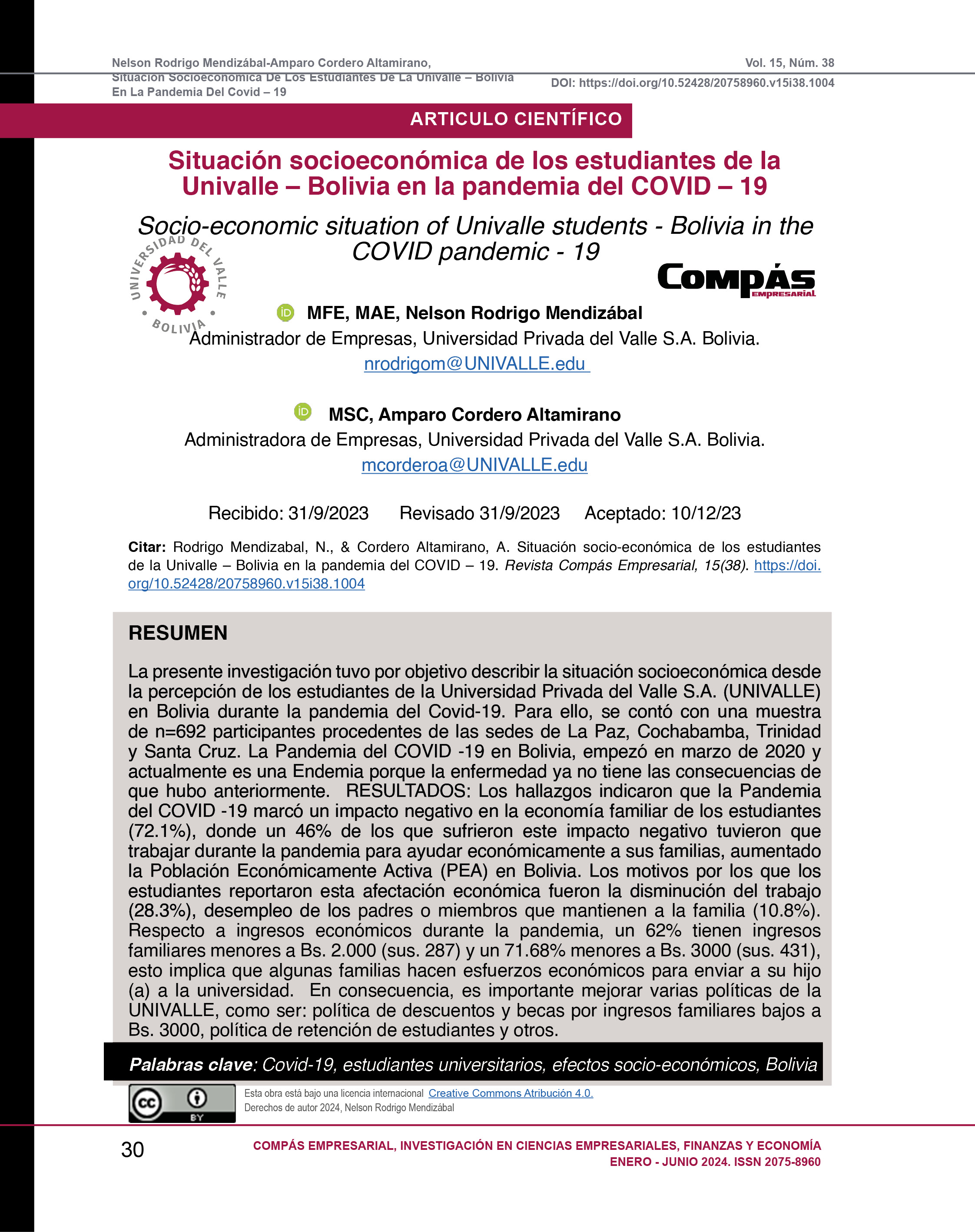SOCIO-ECONOMIC SITUATION OF UNIVALLE STUDENTS - BOLIVIA IN THE COVID PANDEMIC - 19
DOI:
https://doi.org/10.52428/20758960.v15i38.1004Keywords:
Keywords: Covid-19, university students, socio-economic effects.Abstract
The aim of this research was to describe the socio-economic situation as perceived by the students of the Universidad Privada del Valle (Univalle) in Bolivia during the Covid-19 pandemic. For this purpose, a sample of n=692 participants from the La Paz, Cochabamba, Trinidad and Santa Cruz campuses was used. For data collection, an online form was launched in December 2021 to which they responded voluntarily. The COVID 19 pandemic in Bolivia started in March 2020 and is still ongoing to date. RESULTS: The findings indicated that the COVID -19 Pandemic marked a negative impact on the family economy of students (72.1%), where 46% of those who suffered this negative impact had to work during the pandemic to help their families economically, increasing the Economically Active Population (EAP) in Bolivia. The reasons for which students reported this economic affectation were a decrease in work (28.3%), unemployment of parents or breadwinners (10.8%), closure of family or non-family businesses (11.8%), delay or lack of payment to parents or breadwinners (15.4%). Some 2.5% of the students reported the death of their parents. Likewise, it was observed that there was a restructuring of families where they increased (27%), probably due to family mobility where the Pandemic brought them together again. Another important result is that 90% of the students are economically dependent on their parents.
Downloads
References
Banco Mundial. (2021). Bolivia: Panorama general. Recuperado de https://www.bancomundial.org/es/country/bolivia/overview#3
Campoverde D. & Vega A. (2022). Impacto socioeconómico en estudiantes universitarios de la pro vincia de El Oro ante el Covid-19. Revista Científica Cultura, Comunicación y Desarrollo, 7(1), 143-150.
Ceberio, M. & García, F. (2018). Estrategias en psicoterapia Breve. Chile, RIL editores.
Huanto, C. (2020). Dinámica e impacto del Covid-19 en la economía boliviana. Revista de Análisis, Julio - Diciembre 2020, Volumen N° 33, pp. 39-68.
Infante, C., Peláez, I., & Giraldo, L. (2021). Covid-19 y género: efectos diferenciales de la pandemia en universitarios. Revista mexicana de sociología, 83(spe), 169-196. Epub 18 de junio de 2021.https://doi.org/10.22201/iis.01882503p.2021.0.60072
Krepki, D. (2019). El tabú del salario: la construcción de sentidos en torno a la meritocracia en la industria del software. El caso Globant. XIII Jornadas de Sociología. Facultad de Ciencias Sociales, Universidad de Buenos Aires, Buenos Aires. Dirección estable: https://www.aacademica.org/000-023/419
Oficina de PNUD Bolivia (2020). COVID-19 en Bolivia: En la senda de la recuperación del desarrollo. Recuperado de https://www.undp.org/es/latin-america/publications/covid-19-en-bolivia-en-la-senda-de-la-recuperaci%C3%B3n-del-desarrollo
Romero, T., & Matamoros, C. (2020). Impacto académico, económico y psicológico del covid-19 en los estudiantes de la Universidad Nacional Autónoma de Nicaragua. Revista EDUCARE - UPEL-IPB - Segunda Nueva Etapa 2.0, 24(3), 138-158. https://doi.org/10.46498/reduipb.v24i3.1388
https://doi.org/10.46498/reduipb.v24i3.1388
https://doi.org/10.46498/reduipb.v24i3.1388
https://doi.org/10.46498/reduipb.v24i3.1388 DOI: https://doi.org/10.46498/reduipb.v24i3.1388
Vidal, M., Barciela, M. & Armenteros, I. (2021). Impacto de la COVID-19 en la Educación Superior. Educación Médica Superior, 35(1), e2851. Epub 01 de abril de 2021. Recuperado en 17 de junio de 2022, de http://scielo.sld.cu/scielo.php?script=sci_arttext&pid=S0864-21412021000100023&lng=es&tlng=es.

Published
How to Cite
Issue
Section
License
Copyright (c) 2024 NELSON RODRIGO MENDIZABAL, AMPARO CORDERO ALTAMIRANO

This work is licensed under a Creative Commons Attribution 4.0 International License.
Authors who publish with this journal agree to the following terms:
- Authors retain copyright and grant the journal right of first publication with the work simultaneously licensed under a Creative Commons Attribution License 4.0 that allows others to share the work with an acknowledgement of the work's authorship and initial publication in this journal.
- Authors are able to enter into separate, additional contractual arrangements for the non-exclusive distribution of the journal's published version of the work (e.g., post it to an institutional repository or publish it in a book), with an acknowledgement of its initial publication in this journal.
- Authors are permitted and encouraged to post their work online (e.g., in institutional repositories or on their website) prior to and during the submission process, as it can lead to productive exchanges, as well as earlier and greater citation of published work.









